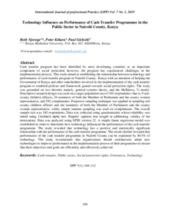Abstract
Cash transfer program has been identified by most developing countries as an important component of social protection however; the program has experienced challenges in the implementation process. This study aimed at establishing the relationship between technology and performance of cash transfer program [aimed at supporting households caring for orphans and vulnerable children] in Nairobi County- Kenya with an intention of helping the Government of Kenya and other stakeholders involved in the implementation of the cash transfer program to establish policies and framework geared towards social protection rights. The study was grounded on two theories namely, general systems theory, and the McKinsey 7s model. Descriptive research design was used on a target population size of 102 respondents: that is, 9 subcounty children officers, 34 nominees of both the Member of Parliament and the county woman representative, and 592 complainants. Purposive sampling technique was applied in sampling sub county children officers and the nominees of both the Member of Parliament and the county woman representative, while, simple random sampling was used on complainants. The overall sample size was 102 respondents. Data was collected using questionnaires whose reliability was tested using Cronbach alpha test. Experts’ opinion was sought in addressing validity of the instruments. Data was analyzed using SPSS version 22. A simple linear regression model was established in order to determine how technology influenced the performance of the cash transfer programme. The study revealed that technology has a positive and statistically significant relationship with the performance of the cash transfer programme. The results further revealed that performance of the cash transfer programme in Nairobi County can be explained by 40.5% of technology. The study recommends that organizations should continuously adopt new technologies to improve performance in the implementation process of their programmes to ensure that their objectives and goals are efficiently and effectively achieved.

